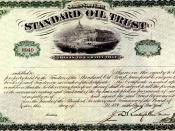Author Mark Twain described the latter half of the nineteenth century as the "Gilded Age," meaning golden, because of the economic opportunities that America had to offer during these times. However, there were some people who sought success selfishly before attempting to revolutionize the economy. The men who took advantage of these opportunities were more robber barons than they were industrial statesmen. More often than not, greed overcame their decisions as capitalists.
During the Gilded Age, the leaders of industry worked towards self-interest, and thus were called "robber barons." In this time period, the focus of these barons was to earn as much money as possible. Many Americans were disgusted with this plan. The less-than-fortunate ridiculed the greedy business leaders and demanded fairness (doc. B). Several workers even hoped to attain equality, and worked toward this goal through strikes, such as the Pullman Strike of 1894. However, for the lucky ones sitting at the top of the social ladder, mass money-making was the foremost goal.
This was achieved through two different methods: vertical integration and horizontal integration. The latter was used by John D. Rockefeller, the king of oil. Horizontal integration is the process of buying the smaller companies that might compete with one company. For example, Rockefeller's Standard Oil Company smaller oil and gas companies (doc. C). Vertical integration is the process of controlling all aspects in a business. The Gilded Age brought corporate greed at its fullest, especially during the 1880s and 1890s. Industries, especially the Standard Oil Company, were looked down upon, but nothing could stop the power of those titanic business empires (doc. D). Thus was the life of a robber baron; stomp out the competition, take as much money as possible, and disregard the poor.
Despite the disgraceful actions of the robber barons,


